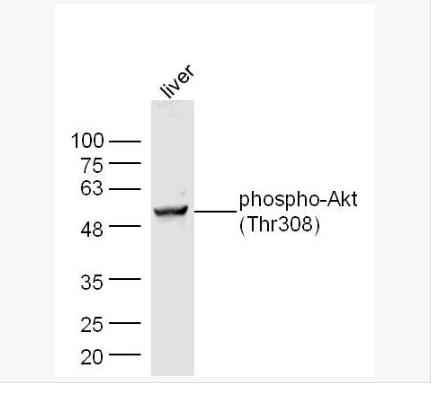Host:Rabbit
Target Protein:phospho-Akt (Thr308)
IR:Immunogen Range:MK(p-T)FC
Clonality:Polyclonal
Isotype:IgG
Entrez Gene:207
Swiss Prot:P31749
Source:KLH conjugated Synthesised phosphopeptide derived from human Akt around the phosphorylation site of Thr308:MK(p-T)FC
Purification:affinity purified by Protein A
Storage:0.01M TBS(pH7.4) with 1% BSA, 0.03% Proclin300 and 50% Glycerol. Shipped at 4℃. Store at -20 °C for one year. Avoid repeated freeze/thaw cycles.
Background:This gene encodes one of the three members of the human AKT serine-threonine protein kinase family which are often referred to as protein kinase B alpha, beta, and gamma. These highly similar AKT proteins all have an N-terminal pleckstrin homology domain, a serine/threonine-specific kinase domain and a C-terminal regulatory domain. These proteins are phosphorylated by phosphoinositide 3-kinase (PI3K). AKT/PI3K forms a key component of many signalling pathways that involve the binding of membrane-bound ligands such as receptor tyrosine kinases, G-protein coupled receptors, and integrin-linked kinase. These AKT proteins therefore regulate a wide variety of cellular functions including cell proliferation, survival, metabolism, and angiogenesis in both normal and malignant cells. AKT proteins are recruited to the cell membrane by phosphatidylinositol 3,4,5-trisphosphate (PIP3) after phosphorylation of phosphatidylinositol 4,5-bisphosphate (PIP2) by PI3K. Subsequent phosphorylation of both threonine residue 308 and serine residue 473 is required for full activation of the AKT1 protein encoded by this gene. Phosphorylation of additional residues also occurs, for example, in response to insulin growth factor-1 and epidermal growth factor. Protein phosphatases act as negative regulators of AKT proteins by dephosphorylating AKT or PIP3. The PI3K/AKT signalling pathway is crucial for tumor cell survival. Survival factors can suppress apoptosis in a transcription-independent manner by activating AKT1 which then phosphorylates and inactivates components of the apoptotic machinery. AKT proteins also participate in the mammalian target of rapamycin (mTOR) signalling pathway which controls the assembly of the eukaryotic translation initiation factor 4F (eIF4E) complex and this pathway, in addition to responding to extracellular signals from growth factors and cytokines, is disregulated in many cancers. Mutations in this gene are associated with multiple types of cancer and excessive tissue growth including Proteus syndrome and Cowden syndrome 6, and breast, colorectal, and ovarian cancers. Multiple alternatively spliced transcript variants have been found for this gene. [provided by RefSeq, Jul 2020]
Size:50ul
Concentration:1mg/ml
Applications:WB(1:500-2000)
ELISA(1:5000-10000)
IHC-P(1:100-500)
IHC-F(1:100-500)
Flow-Cyt(1μg /test)
IF(1:100-500)
Cross Reactive Species:Human
Mouse
Rat
Chicken
Dog
Pig
Cow
Rabbit
Sheep
 本品僅供科研使用。不能用于人和動物治療等其它臨床診斷用����!
本品僅供科研使用。不能用于人和動物治療等其它臨床診斷用����!
關鍵字: AKT ;RAC;MGC9965;PKB;PRKBA;AKT1_HUMAN; RAC Alpha;C AKT;
上海滬震實業(yè)有限公司是一家集研發(fā)����、生產(chǎn)和銷售于一體的生命科學實驗室產(chǎn)品生物科技企業(yè)���。主營產(chǎn)品:試劑盒�����,ELISA試劑盒����,抗體�,重組蛋白,血清�,胎牛血清,細胞,原代細胞 細胞培養(yǎng)試劑�,常用生化試劑。